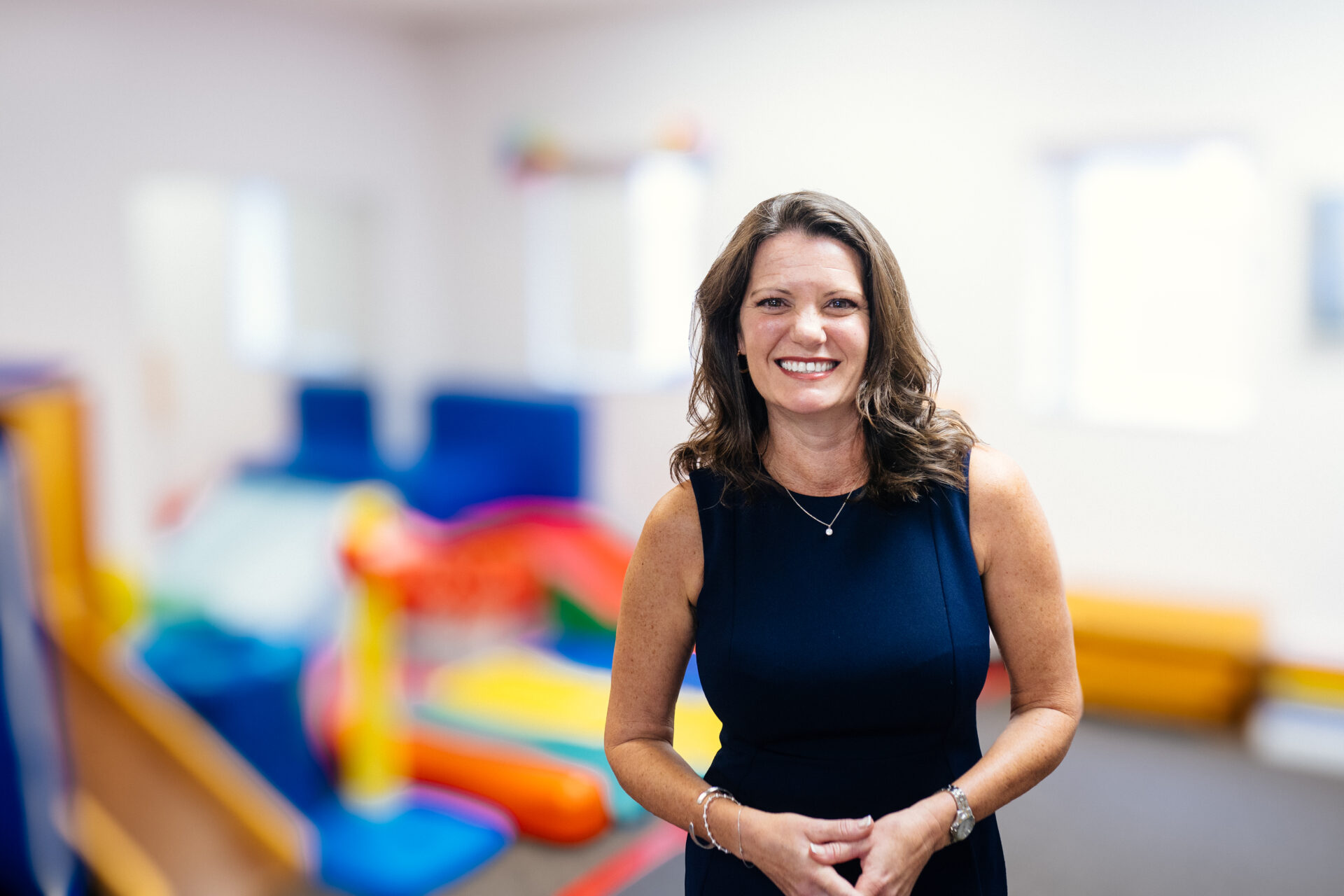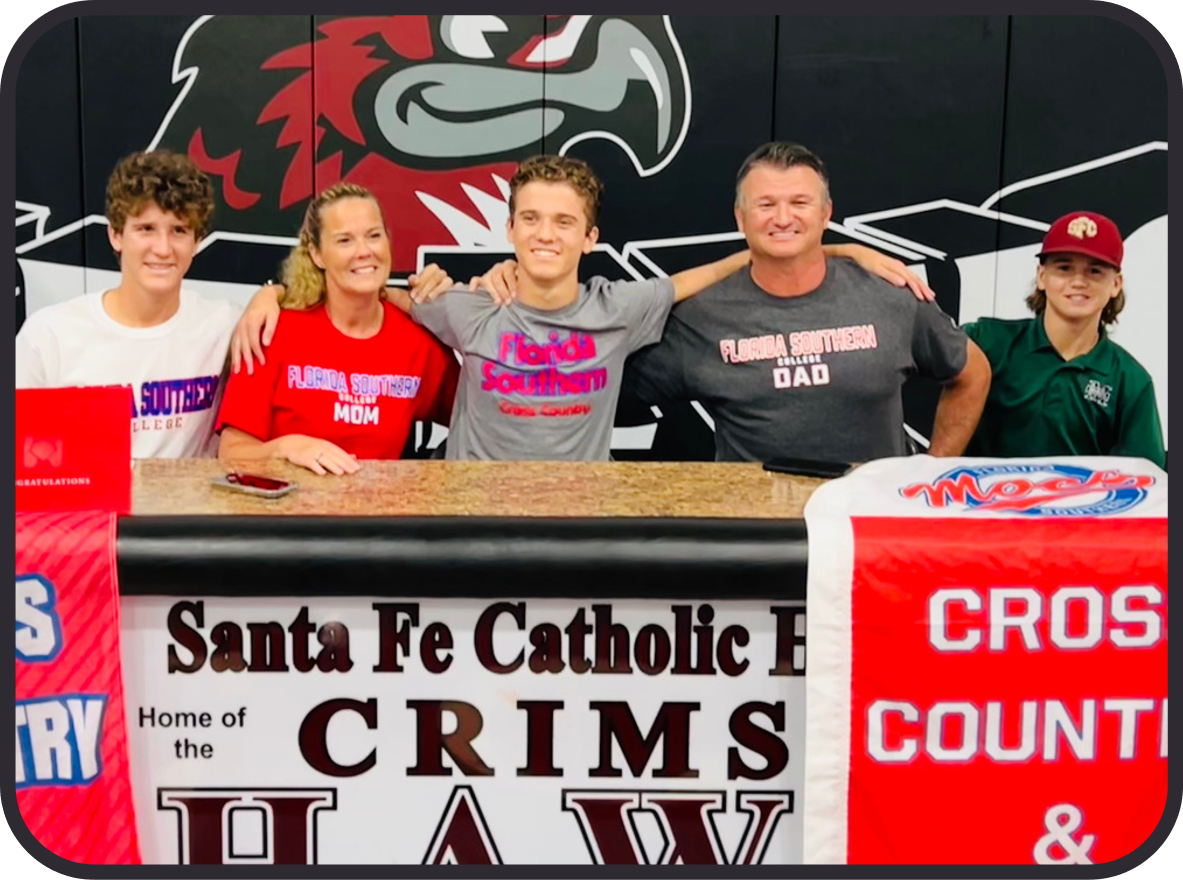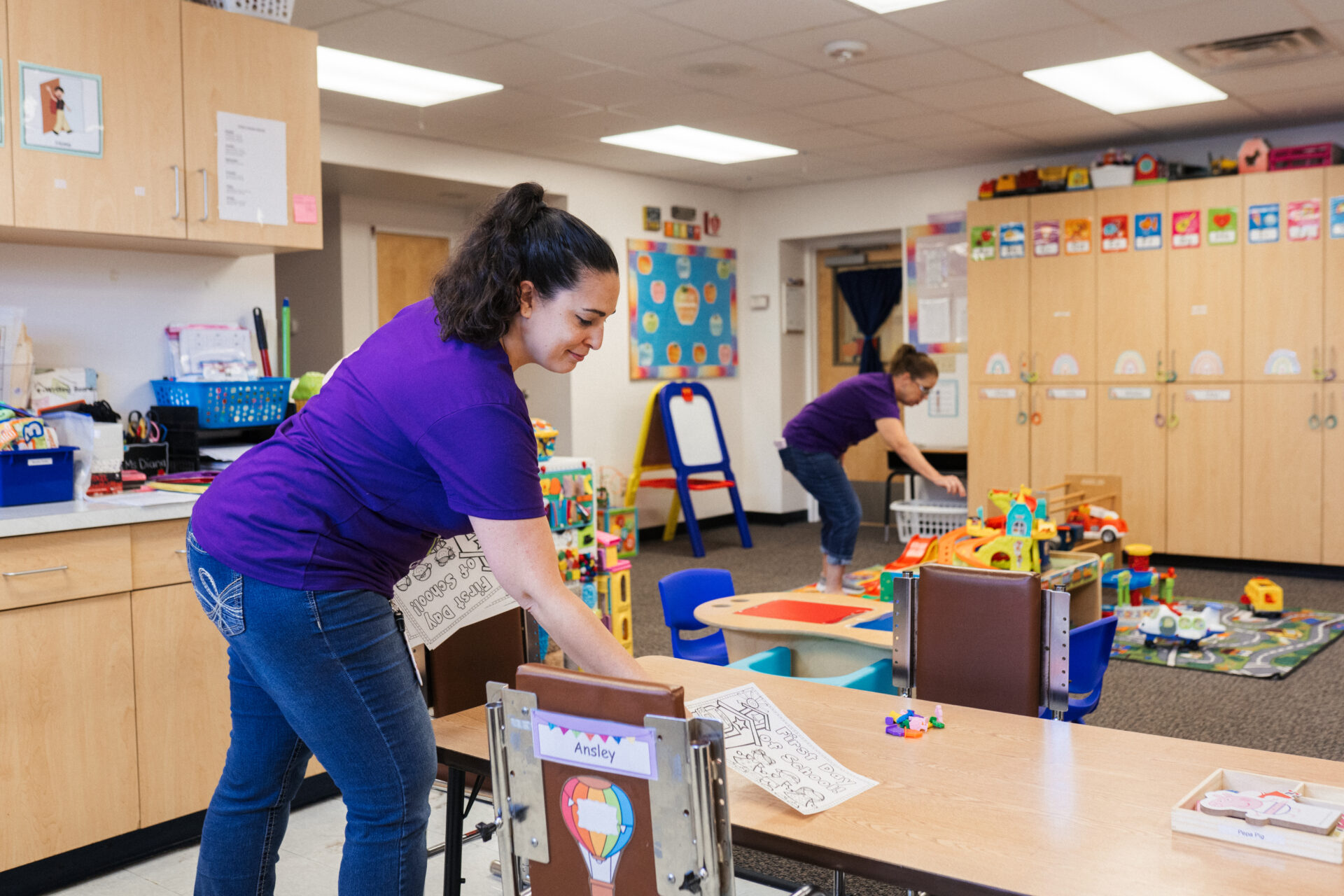
How Achievement Academy is Creating Brighter Futures for Children With Special Needs
By Adam Spafford
Photography by Jordan Randall
‘These kids are worth it and deserve the very best we can offer them.”
That’s how Achievement Academy President Kristin Aiken, her desk facing pictures of children receiving life-giving developmental therapy, summarizes the organization’s purpose and ethos. The school, whose main Lakeland campus is located just north of Downtown, serves students with special needs, those at heightened risk for developmental delays, and their parents. Achievement Academy’s dedicated staff—with strong family partnerships, generous support from grants and private donors, and a lot of heart—provides remarkable education and care to maximize the potential of every student.
Though differentiated education is mainstream now, it hasn’t always been so. Schools like Achievement Academy were far ahead of the traditional education system by recognizing a universal approach to students’ varying needs and abilities wasn’t optimal. The Academy traces its roots to 1956 when a group of Polk County parents established the United Cerebral Palsy School. It received its charter from the Polk County School Board in 1997, making it now one of the longest-standing charter schools in Florida. The current name was adopted in 2004 and currently boasts additional locations in Bartow and Winter Haven, serving over 150 students in all.

“Our ability to provide therapies in individual settings sets us apart. You’ll often find therapists in the classroom, giving strategies to the classroom teams to augment what each student is doing in therapy.”
– Achievement Academy President Kristin Aiken
Achievement Academy accomplishes its mission through two programs: Birth to Three and Pre-Kindergarten.
“Our Birth to Three early interventionists visit a premature child’s home once a month with activities for language, cognitive, social, emotional, and motor skill development. Each of our four early interventionists serve about 60-70 families in 14 Polk municipalities,” Aiken said. “If a family lives in the county and enrolls in services, we will find a way to see them. It’s a great way to coach and support parents as they learn strategies for educating their child. We also provide developmental toys, boppy pillows, swaddling blankets, and other materials they’ll need.”
In addition to being a true Pre-K, Achievement Academy’s Pre-Kindergarten program offers individual physical, speech, and occupational therapy for children 18 months to 5 years old. A child must show a certain level of developmental delay, but as long as the family resides in Polk, there are no income restrictions and it’s free to attend.
“Our ability to provide therapies in individual settings sets us apart,” Aiken said. “You’ll often find therapists in the classroom, giving strategies to the classroom teams to augment what each student is doing in therapy.”
Teachers share information about current lessons so therapists can integrate material into one-on-one sessions and together they help students master vital skills.

Daniel Welling, a student at Achievement Academy as a toddler and young child, is now attending Florida Southern College on a scholarship to run cross country.
The success stories made possible through this learning environment—of which there are many—are compelling. Born at 26 weeks weighing just 2 pounds 1 ounce, Daniel Welling is a prime example of a micro preemie (defined as a baby born at or before 26 weeks of pregnancy or weighing less than 28 ounces) that Achievement Academy serves so well.
He received early developmental therapy through USF Early Steps and entered Achievement Academy’s Winter Haven campus at age 4, transferring to the Lakeland campus when a spot opened up closer to home. In the year and a half Daniel spent there, parents Jason and Alyssa saw the school’s miraculous work. In addition to his need for continued physical and sensory therapies,
“Daniel was both extremely shy in some ways but also very unfocused,” Alyssa said. “He needed constant re-direction to concentrate on tasks. Achievement Academy’s teachers were so patient, so kind, so accepting of Daniel.
She noted how the classrooms are constructed in fun purposeful ways that allow kids to feel at home while receiving the therapy they need.
“Because the school welcomes parents, I would visit the classroom and find their work almost unbelievable,” she said. The kids learn how to be good students and good friends, all rolled into this perfect little school.”
Daniel, now 19, was able to move on from his experience at Achievement Academy with so many of the skills he needed to be successful at the next level and for the long haul. He recently graduated from Santa Fe Catholic High School with a 3.2 GPA, and he finished 6th in his class in the mile run at the state championships as a senior, crossing the finish line in a time of 4:24. He is set to attend Florida Southern College in the fall on a cross country scholarship. “It’s not only that their intervention was critical for Daniel’s development,” says his father, Jason, “but our whole family’s connection to the teachers, staff, board continues in perpetuity.”
That reality aligns well with the fact the school’s mission explicitly includes support of student’s families, recognizing that parents of children at risk of developmental delays or special needs can often feel isolated and scared.
Aiken said that teachers and early interventionists often become part of the families they serve.
“We once did a presentation for United Way where an Achievement Academy parent spoke before the group. The parent’s baby began to cry during the talk and the family’s interventionist comforted the baby so the parent could continue. It was a lovely moment,” she recalls.
The staff member who leads support services for families knows just how important that sense of community is because her own children attended Achievement. Throughout the year she schedules special events such as potty training by an autism specialist and monthly coffees at each of our campuses for parents to ensure families know they are never alone.
As with most non-profits, Achievement Academy’s biggest need is funding.
“The service level we provide far exceeds our funding from the district as a charter school, but it’s crucial to continue because we see the effectiveness of our model. I spend a lot of time writing grants and promoting our biggest annual fundraiser, Top Chef,” Aiken says, “We’re so very fortunate that Lakeland is a generous community. Whether it is our many corporate sponsors including Publix and Geico or independent groups and individuals who are passionate about early childhood development, Lakeland has supported Achievement Academy financially as well as with sweat equity. We love the opportunity to show people the truly life-changing differences we can make together.”
Aiken doesn’t see the need for Achievement Academy’s work waning as demand already exceeds the organization’s capacity already with Lakeland’s population continuing to grow, and an estimated 10 percent of births in Polk County being premature.
“Last year we had 500 referrals and we have a long waiting list for the charter school. My dream is to have a state-of-the-art facility that can accommodate every family on the waiting list as well as an expanding room for staff members who have to creatively share space right now. The larger space would allow Achievement Academy’s community to grow stronger, perhaps bringing our Birth to Three families from home to a group setting, for example.”
When it comes to mitigable risk factors for developmental delays, Aiken stresses the importance of prenatal care.
“A low level of prenatal care is a risk factor, so it’s critical to educate expectant mothers about nutrition and healthy habits . During the first three years, including in utero, a child’s brain has the capacity to develop at a rate of about one million connections per second. Good prenatal care supports that development,” she said.
She urges parents of premature children to seek early intervention so that they can have assistance to help children work toward developmental milestones.
“We often get referrals for the NICU so that we can start working with premature babies right away,” she said. “There’s no cost to enroll or participate in the home program. If a parent or family isn’t sure if they’re seeing a developmental delay, they can call and self-refer to our program.”





